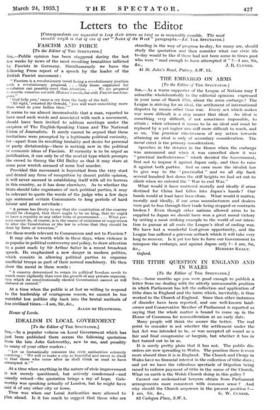THE EMBARGO ON ARMS
[To the Editor of THE SPECTATOR.] Snt,—As a warm supporter of the League of Nations may I subscribe wholeheartedly to the editorial opinions expressed in your issue of March 17th, about the arms embargo ? The
League is striving for an ideal, the settlement of international disputes by means other than war. Every act which makes war more difficult is a step nearer that ideal. An ideal is something very difficult, if not sometimes impossible, to attain ; when attained it ceases to be an ideal and must be replaced by a yet higher aim still more difficult to reach, and so on. The practical effectiveness of any action towards attaining an ideal is only of secondary consideration. The moral effect is the primary consideration.
Speeches in the debates in the House when the embargo was announced and when it was cancelled show it was "practical ineffectiveness" which decided the Government, first not to impose it against Japan only, and then to raise it against both parties. And so once more the idealist has to give way to the " practicalist " and we all slip back several hundred feet down the stiff heights we had set out to climb when we entered the "War to end War."
What would it have mattered morally and ideally if arms destined for China had fallen into Japan's hands ? Our hands would at least have been clean. What would it matter, morally and ideally, if our arms manufacturers and dealers were put to loss through their trade being stopped or contracts broken ? Even though other nations allowed arms to be supplied to Japan we should have won a great moral victory by setting a most striking example to the world of our inten- tion to pursue at all costs the League's ideal of ending war. We have lost a wonderful God-given opportunity, and the League has suffered a grievous setback which it will take very long to recover. Is it yet too tate to force our Government to reimpose the embargo, and against Japan only ?—I am, Sir, 040Td. HERBERT HEALY.






































 Previous page
Previous page